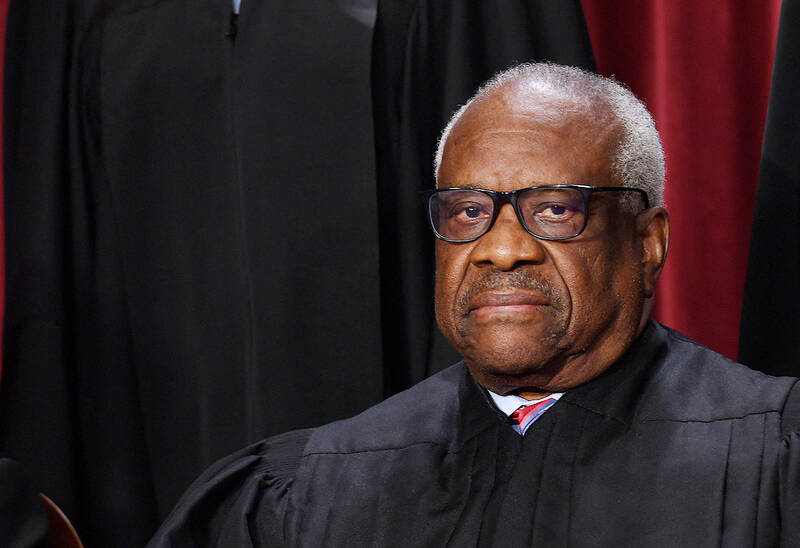You’ve heard of racism and sexism, but there’s a horrifying new -ism we all need to be aware of: wealthism. The obscenely rich, you see, are an increasingly persecuted minority, vilified in modern society. Wealthism is so deeply entrenched, that without even knowing it, you’re probably using anti-wealth language and making billionaires feel very sad indeed.
This public service announcement is brought to you by the Wall Street Journal’s editorial board, which just published a scathing piece about a ProPublica investigation into US supreme court justice Clarence Thomas’s friendship with a Republican mega-donor and billionaire property developer called Harlan Crow.
In a deeply reported piece, ProPublica revealed that Thomas and his wife Virginia (a conservative activist who allegedly tried to overturn the 2020 election) have accepted luxury trips from Crow for more than two decades without disclosing them. And we’re not talking a couple of nights in a Hilton here — we’re talking private jets and superyachts. One vacation the supreme court justice was treated to would have cost at least US$500,000 if he’d paid for it himself. Which, to reiterate, he didn’t.

Photo: AFP
Why was the Wall Street Journal so shocked by this article? Were they worried about one of the most powerful people in the US, a man whose decisions can affect millions of people’s lives, being potentially influenced by a billionaire with strong views and reportedly a disturbing amount of Nazi memorabilia? Nah, they were appalled by the incendiary use of wealth-adjacent adjectives by ProPublica.
“The piece is loaded with words and phrases intended to convey that this is all somehow disreputable,” the editorial board wrote. “‘Superyacht;’ ‘luxury trips;’ ‘exclusive California all-male retreat;’ ‘sprawling ranch;’ ‘private chefs;’ ‘elegant accommodation;’ ‘opulent lodge;’ ‘lavishing the justice with gifts.’ And more.”
Yep, I regret to inform you there were even more words in the article — shocking stuff.
What, one wonders, would have been acceptable terminology? How exactly should one describe a “superyacht” or a “private chef” in reputable terms? The Journal did not provide any guidance on the matter. Luckily for us, however, some aggrieved billionaires have already stepped in to offer suggestions on how to be more compassionate towards rapacious capitalists. In 2019, ex-Starbucks CEO Howard Schultz told a New York Times columnist that “the moniker ‘billionaire’ now has become the catchphrase” and suggested it may be better to use expressions like “people of means” or “people of wealth.”
Weirdly, those phrases didn’t catch on and poor old Schultz, who is worth US$3.7 billion, has been repeatedly subjected to the billionaire slur. Last month, while he was being questioned during a senate hearing about union-busting, Schultz had a meltdown after senator Bernie Sanders called him a “billionaire” one too many times. That word is “unfair,” Schultz complained.
“This moniker ‘billionaire’, let’s get at that, OK?” he said. “I came from nothing … Yes I have billions of dollars, I earned it.”
Take note: he’s not just entitled to his billions, he’s entitled to your respect!
Jay-Z, who is worth around US$2.5 billion, has also taken umbrage at the language that is used to describe people of wealth. In a Twitter Spaces conversation last year, he seemed to call the word “capitalist” a slur akin to the n-word.
“They start inventing words like ‘capitalist’ and things like that,” the rapper and businessman complained. “We hustled, we fucking killed ourselves to get to this space and now it’s like, ‘eat the rich.’”
Ah, yes, “capitalist:” a word famously invented by an angry tween on Twitter just a few years ago.
While it’s fun to laugh at fat cats’ thin skin it’s also alarming to see the ways in which the ultra-rich are trying to obfuscate soaring inequality by reconfiguring how we talk about immense wealth. We may not all be saying “people of wealth” yet, but in some cases the 1 percent’s rebranding efforts have been successful. Take the word “elite” for example. The “elite,” you’ve probably noticed, now means anyone with an education who leans vaguely left. An impecunious academic? An elite! A billionaire? A humble person of means! It’s not enough that the ultra-rich are trying to take money out of our pockets, they’re also trying to put words in our mouths

Taiwan doesn’t have a lot of railways, but its network has plenty of history. The government-owned entity that last year became the Taiwan Railway Corp (TRC) has been operating trains since 1891. During the 1895-1945 period of Japanese rule, the colonial government made huge investments in rail infrastructure. The northern port city of Keelung was connected to Kaohsiung in the south. New lines appeared in Pingtung, Yilan and the Hualien-Taitung region. Railway enthusiasts exploring Taiwan will find plenty to amuse themselves. Taipei will soon gain its second rail-themed museum. Elsewhere there’s a number of endearing branch lines and rolling-stock collections, some

The Democratic Progressive Party (DPP), Chinese Nationalist Party (KMT), and the country’s other political groups dare not offend religious groups, says Chen Lih-ming (陳立民), founder of the Taiwan Anti-Religion Alliance (台灣反宗教者聯盟). “It’s the same in other democracies, of course, but because political struggles in Taiwan are extraordinarily fierce, you’ll see candidates visiting several temples each day ahead of elections. That adds impetus to religion here,” says the retired college lecturer. In Japan’s most recent election, the Liberal Democratic Party lost many votes because of its ties to the Unification Church (“the Moonies”). Chen contrasts the progress made by anti-religion movements in

Could Taiwan’s democracy be at risk? There is a lot of apocalyptic commentary right now suggesting that this is the case, but it is always a conspiracy by the other guys — our side is firmly on the side of protecting democracy and always has been, unlike them! The situation is nowhere near that bleak — yet. The concern is that the power struggle between the opposition Chinese Nationalist Party (KMT) and their now effectively pan-blue allies the Taiwan People’s Party (TPP) and the ruling Democratic Progressive Party (DPP) intensifies to the point where democratic functions start to break down. Both

This was not supposed to be an election year. The local media is billing it as the “2025 great recall era” (2025大罷免時代) or the “2025 great recall wave” (2025大罷免潮), with many now just shortening it to “great recall.” As of this writing the number of campaigns that have submitted the requisite one percent of eligible voters signatures in legislative districts is 51 — 35 targeting Chinese Nationalist Party (KMT) caucus lawmakers and 16 targeting Democratic Progressive Party (DPP) lawmakers. The pan-green side has more as they started earlier. Many recall campaigns are billing themselves as “Winter Bluebirds” after the “Bluebird Action”